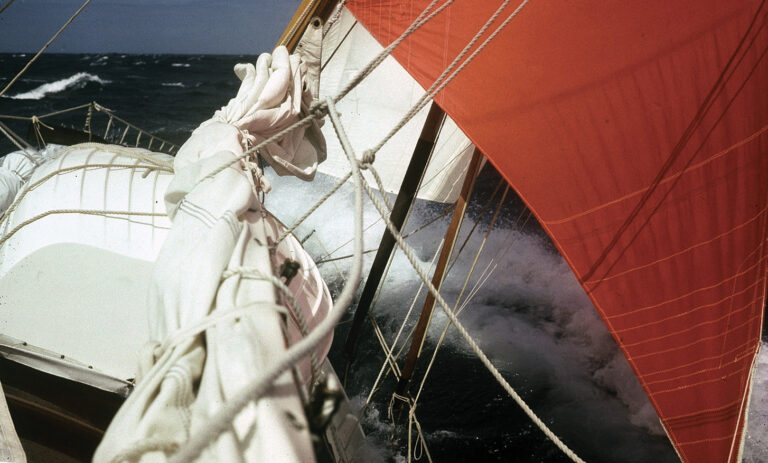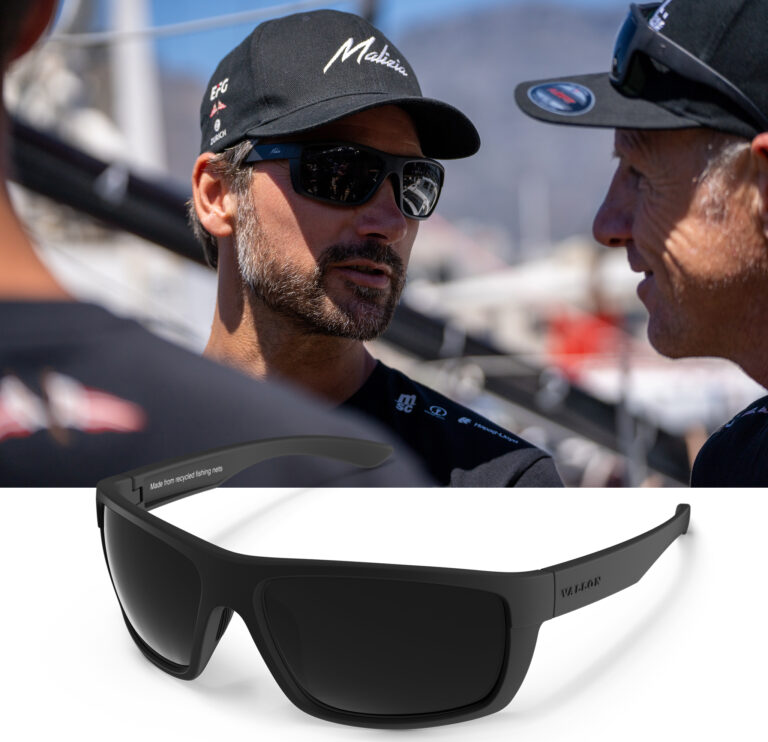
Prevailing Wind
By Thomas Dolby
Archway Publishing, hardcover $39.99
When he was a youngster, Thomas Dolby received a book by Beken of Cowes, and the oversized black-and-white images of the majestic America’s Cup yachts of the turn of the century enthralled him. Beneath the literal clouds of sail were sailors—“Those tiny little dots along the rail were actually men, it was just inconceivable. I mean, who were they? And that was what really gave me the idea that maybe I could work some of these characters into a novel.”
Dolby is best known as the electronic music pioneer whose innovative approach to synthesizers in the 1980s earned him five Grammy awards and the Billboard Top 5 hit “She Blinded Me With Science.” These days he continues to perform, and he has taught music at Johns Hopkins University in Baltimore.
But he’s also a lifelong sailor whose heart belongs to classic wooden sailing yachts. And he’s a student of history with a keen interest in the Progressive Era of the early 1900s in the United States, when industrial tycoons amassed enormous wealth, and events like the Triangle Shirtwaist Factory fire in 1911 and the rise of the Suffragette movement fueled social unrest over economic and cultural inequities.
All of this provides the backdrop for Dolby’s first novel, Prevailing Wind, the story of a challenge for the America’s Cup that weaves into its plot a mystery in the heart of the New York Yacht Club, and the thorny relationship between two brothers from Maine who are, in what becomes their separate ways, recruited to sail for yachts aiming to contend for the Cup.
Davey and Jacob Haskell, 19 and 21 respectively, are fishermen in a poor community on Penobscot Bay who get their shot at glory when a New York Yacht Club millionaire comes to visit, seeking crew for his syndicate’s Cup challenger. It was common practice, Dolby says in a video promoting the book, since it took upwards of 40 men to sail the massive yachts, and the crew “couldn’t be other New York Yacht Club members with their soft hands. It had to be hardy, weather-beaten Maine lobstermen. That’s where they got their crews from. Their hands were already leathery. They didn’t feel the cold. They worked together as a team. In a bad season for fishing or lobstering, they really needed the money.”
Davey and Jacob’s father, now bedridden and incapacitated from a likely stroke, had once crewed aboard a contender—a fact that helps set their destiny, as well as the book’s central mystery, in motion. We see most of the action through Davey, whose cerebral, romantic nature is quite the opposite of his confident, swaggering older brother. Dolby’s attention to detail and imagery—whether describing a dark, gritty scene in The Bowery or the intricacies and power of sailing an insanely over-canvassed yacht of the era—is precise and compelling.
“Davey sighted up his now-rigid backstay all the way to the tip of the topmast, a hundred and sixty feet above the water,” Dolby writes of Davey’s first time aboard such a yacht during the crew tryouts. “The windward shrouds and runners creaked, taking up the strain on the masts. As the schooner heeled and accelerated, the sails took on the smooth aerodynamic curves designed into them. Westward was a beautiful cloud of white Egyptian cotton. The power and sheer scale was like nothing Davey had ever seen: it was physics in motion. He had to remind himself to keep breathing.”
Dialogue is one of the hardest things to write well, but Dolby’s is spot on in this debut novel, lively, well-paced, and seamlessly adopting the syntax and vernacular of the era—in Maine and New York City, in the rough-and-tumble fishing community and the rarefied realms of American privilege—without overdoing it. Likewise, the plot and its twists keep the pages turning fast after sucking you straight in at the start. Even the relationship that develops between Davey and the young Harold S. Vanderbilt, while profoundly unlikely, is believable in the context Dolby is conjuring it. The only place I felt the authenticity stumble was toward the end, but no spoilers here.
Prevailing Wind is a terrific read that employs the art, science, passion, and intrigue of high-stakes yacht racing to illuminate the history of a tumultuous time and the cultural and economic chasms that defined it. Through the eyes of young Davey Haskell, it’s a story of hardship and opportunity, grit and glory, and above all the love and wonder of sailing in a legendary time for the sport.
—Wendy Mitman Clarke


















